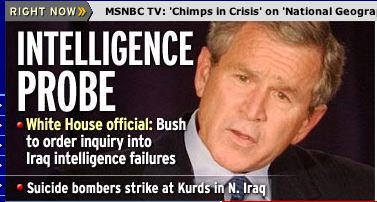February 29, 2004
Dean's Campaign Stresses
There's a detailed Washington Post article that details a lot of the "bickering" that took place inside the Dean campaign. It's too bad.The article is a bit slanted, particularly in its implication that Dean "did not really want to be president." The supporting points for that are weak.
But, Mathew Gross, the former lead blogger for the Dean campaign, says the article is pretty much accurate.
Mathew Gross is involved with Change For America. It strikes me as possible that we are seeing the beginnings of public "differences" between Change For America and Dean For America. It's obvious there is at least opportunity for bad blood between the two.
And, here's a response to the article from Howard Dean.
The quotes attributed to me by others in Howard Kurtz's gossipy rendition of the divisions in the Dean for America campaign are entirely false, as is the description of my reaction after losing the Iowa caucuses, before the famous speech.So, Mathew Gross, a public face of Change For America, is on record saying the article is accurate. Dean is on record saying it is not.The danger of using unattributed sources as Kurtz and so many others do, is that the veracity of the informants can not be evaluated. In this case Kurtz included a significant amount of material which was not true, and produced a story which was greatly exaggerated.
There have been many inquiries about the relationship between Dean For America and the Change for America website. The answer to the question is that there is no relationship. We intend to form a progressive grassroots organization based on the Dean for America campaign, and we will work with other organizations after we get set up. We will announce the set up on March 18.
In the meantime, my deepest thanks to all of you who worked so hard to change America. We are not giving up, and we have an outline about what we intend to do on the DFA website.
Many thanks,
Howard Dean
This is concerning to me. I want to see a public unity display between these two organizations pronto.
Update: Change for America addresses the situation.
MT-Revision Plugin
If you are a movable type user, you might be interested in my MT-Revision plugin. It saves the "main" and "additional entry" parts of your blog entry, and if you revise those parts of your entry, it saves the revision history. You can then browse the differences between versions.
February 27, 2004
Nader's Responsibility
Daily Kos || The Ethic of (Ir)Responsibility:"Nader refuses to entertain any discussion of the real-world effects of his actions as presidential candidate in 2000, either as it affected the voting or in terms of the results of that campaign. He repeatedly blames Katherine Harris and the U.S. Supreme Court for the fact that Bush became President, while refusing to consider that had he not been in the race that Gore would probably have won New Hampshire and would have won Florida by a margin too great for Harris and Jeb Bush to undermine. He says little about what he would do as President, revealing that he has no expectation of winning. He repeatedly make the absurd claim that those who've implored him to not run are just "hostages to an antiquated winner-take-all system" trying to "deny democracy and free speech," when in reality they are just pointing out that millions of people could bear he costs of his irresponsible exercise of democracy and free speech. In essence, he's painted a picture of himself in as a martyr, but he refuses to see that his saintliness will result not in his sacrifice but in the sacrifice of the legislative and consumer protections he's achieved, the ideals he claims to embody and protect, and the people on whose behalf he claims to act."This is a great entry. There's a section down below on how to determine whether someone really does have a calling to politics.
Change For America Summit
Change for America: The Evolution of Change for AmericaWell, this is intriguing. Public summits with secret agendas coming soon to a city near you.
February 25, 2004
WA Strangeness Conclusion
I posted my conclusion to the whole Washington Caucus matter that I've been following, over at dailykos. I might repost it here if I find cause for revision, but for now, go over there to read it.
Third Party Realities
This is an article that was submitted to kuro5hin.org and then rejected due to partisan voting.Over the last couple of years, I have done quite a bit of research into U.S. political voting systems and various vote-counting methods. I've come up with the following conclusions, some of which I didn't expect:
- The presidential race should absolutely not have third-party candidates.
- Preference voting is not the answer for presidential voting while the Electoral College exists.
- Democrats and Greens need to share fault for 2000, and share the responsibility to join forces in 2004.
- Bush technically had more electoral support than Gore even without the Supreme Court's help.
Submitting to Systems; Pragmatic Principles
One of the basic principles that guided my research was the conviction that when one submits to a system, one also has to submit to the pragmatism that that system requires. I can argue all I want about the inequities of our current voting system, but if I'm going to use it (as I should since the political effects will ultimately affect me), I should use it in a way that aligns with my political intent.
For instance, Nader asked us to "vote our principles" in 2000, when many of us had principles that said we liked Nader best, but preferred Gore to Bush. The problem was that our voting system did not have room for these principles. By asking us to ignore our preference of Gore over Bush, those who had that preference but voted for Nader were ultimately casting an unprincipled vote. (Those that believed Nader actually had a shot at winning, or who honestly saw no difference between Bush and Gore, however, were casting principled, if uneducated, votes.) I came to the conclusion that what would have been more principled would be to vote for the candidate closest to my beliefs that had a shot at winning, and then work to implement a voting system that had more room for my principles.
The Electoral College
One system we are forced to submit to is the Electoral College. The first thing to realize about the Electoral College is that it will be very, very, very hard to change it. If 2000 didn't change it, it is hard to imagine what it would require given our current congressional makeup. Replacing it with a nationwide popular vote won't happen as it is too counter to the interests of Congress; it would likely require a different scheme to advocate. At this point, it looks like it would require massive congressional change over a period of years to get enough representatives in there that would vote to overturn it.
Until that happens, it is the only game in town for electing Presidents. And there's one important facet of it to keep in mind: it requires a majority of 270 votes (out of 538) to win.
What this basically means is that for someone to win the Electoral College outright, they have to get more electoral support than all other Presidential Candidates combined. It's not enough to make a good show. You have to decimate the field. Right now when we have two major parties, it's not a big deal, because no other party strongly competes with them.
But imagine what would happen should a Green, Libertarian, or Reform candidate get enough support to actually win a state or two. First, absolutely nothing happens for the third-party candidate. They would have to win at least the eleven most populous states (which includes California, Florida, and Texas; a strange trifecta). But, what would happen is that either the third party would be ideologically similar to one of the two major parties, splitting its support, or it would lead to none of the parties getting 270 votes.
When no candidate gets 270 votes, the election goes to Congress for them to decide among themselves. And unless the third party has strong congressional representation, they are out of luck.
The long and short of it is that if a third party wants to become president, they are either going to have to have a strong enough national party to enable them to win several states outright, or they are going to have to have a strong enough national party that they would have a plurality of congressional representatives in Congress. Either way, it requires a strong national party with significant local and statewide support and a significant number of elected officials. None of our third parties have this level of strong support at this time.
Now, the lazy conclusion would be to think that the third parties should shut up and go away. This is of course wrong. Instead, they should seek to form coalitions.
When more than two parties are represented in parliament or Congress, and when a bill requires a Yes or a No vote, the multiple parties coalesce into two camps. What's important to realize is that coalitions always ensue in democracy. The difference is when they happen.
In parliamentary democracies, the coalitions happen after the representatives are elected. In an effective American democracy, the coalitions can still happen; they just need to happen before the election. This is the advantage the GOP has over the Democrats right now - they have learned this lesson, while the Democrats have not. In 2000, the Greens and the Democrats failed to form a coalition, which is the fault of both parties.
Due to all of this, the reality is that until a third party has a strong enough national party to compete in a presidential election or in Congress, the only way to pragmatically play the game in presidential races is to form coalitions with the party that they are closest to in ideology.
Preference Voting
One way to make it easier for third parties to build nationwide support is to allow preference voting. Preference voting allows people to specify their full preferences and protect themselves from vote-splitting and "lesser of two evils" voting. However, preference voting is not a good idea for presidential elections.
For as long as the electoral college exists, presidential elections will be decided on the state level, state by state. Given the requirements of the electoral college, preference voting only makes it easier for a third party to win a state here and there, throwing the election to the House. This should not be toyed with until a third party honestly has a realistic chance of winning 270 votes worth of states all in one year. For those seeking to implement preference voting, the responsible approach is to seek to implement them for local and statewide races (including national congressional races) in order to build strong national support. But in the meantime, for presidential elections, forming coalitions is the best approach.
And a word about preference voting: it is well-established by now in voting theory circles that IRV is flawed and Condorcet - where the winner beats every other candidate in a head-to-head matchup - is superior. There is also fondness for Approval voting, but there is one problem with this - many state constitutions already make allowances for ranked voting, but not for Approval voting. There is more of an obstacle against it. Approval voting also has a psychological barrier in that people tend to think in choices, and user testing has shown that voters tend to resent giving an equally-weighted vote to their second choice, especially when it results in their second choice winning the election. This has resulted in Approval voting being approved and then thrown out in at least one locality that I've heard of, although I can't find the reference.
National Electoral Support
One of the irrelevant statistics in judging presidential races is the national poll. This is because our presidency is not decided by a national popular vote. Instead, our less populous states are given extra weighting compared to our more populous states, to recognize state sovereignty. This is consistent with how Congress is set up - more populous states get more Representatives, but every state gets two Senators. For presidential voting, every state gets an electoral vote for each Rep and Senator.
A good way to calculate actual nationwide support is to weigh the nationwide popular vote by each state's electoral power. While the implementation of our electoral college is antiquated, this is a way to calculate its actual intent. I calculated this for the 2000 results. I took each state's electoral votes, and split them up proportionally to each presidential candidate, according to how many votes that candidate got in that state. Using this formula, we find for instance that Gore got 12.16 electoral votes in Texas out of 32.
After totalling up all the voting power for each of the candidates, I calculated the "electorally-weighted popular vote", and came to an interesting result. Bush actually outscored Gore. There was no winner take all factor - a swing of a few hundred votes in Florida made no difference. But by applying the ratios to the popular vote, I had a weighted popular vote, with Bush getting 48.17% of the vote, and Gore getting 48.03% of the vote. Bush actually had more electoral support nationwide than Gore did.
Accepting for the moment that Gore actually won Florida, then why did Gore win? There are many inequities in the electoral college implementation, chiefly among them being the winner-take-all nature of each state. And I found that of the seven closest states, Gore got five of them. The other two were New Hampshire, and Florida. The inequities actually worked in Gore's favor, overall.
Now, it is important to remember that these are counting the votes as they were recorded by the various Secretaries of State. And given what we know about Florida disenfranchising tens of thousands of ex-felons (and non-felons), we know that the intent of the voters were more for Gore than the recorded tally shows. I personally believe that the GOP has a fraud advantage of 0.5 - 1%. However, there is not good reason to believe that the fraud advantage the GOP had in 2000 has lessened since then, especially with the onset of blackbox voting.
The basic thing to realize here is that if Democrats want to win in 2004, it is not enough to wish to duplicate 2000 simply with a fairer count. First, there isn't a good reason to expect a much fairer count, and second, the Democrats actually had less electoral support in 2000, only "winning" due to electoral college inequities working in their favor, which is hard to control in future elections. To win, Democrats really do need to build more support.
Conclusion
Overall, this suggests a clear strategy for those interested in supporting Democrats and Greens, improving democracy, opposing the current administration, and having our votes better represent our intent:
- Recognize that 2004 is about building new support for Democrats and constructing arguments to appeal to ambivalent and swing voters.
- To support third parties, immediately seek to always run a candidate against an otherwise unopposed incumbent congressional member. Several House races every year run unopposed, and there would be no vote-splitting cost to run a third party candidate against them.
- Research state constitutions and secretary-of-state policies about preference voting, and lobby your state legislature to allow preference voting for state issues. Start on the local level to familiarize voters. Advocate vote-counting systems where the winner is always from the Schwartz set of Condorcet voting, because vote theorists agree that this is always the most fair result if the intent is to represent consensus public support. Advocate preference voting for local, state, and national congressional elections.
- For presidential races, convince your third party to become active in lobbying the major party that is closest to its ideology, to extract concessions for your party's support.
- Oppose third party presidential races for as long as the Electoral College exists, until a third party has significant nationwide support.
- Oppose opportunity for vote fraud by supporting congressional bills that require paper trails (which are NOT the same thing as receipts that voters take with them, and are therefore not open to the vote-trading flaw), such as Congressman Holt's H.R. 2239 and its companion Senate bill.
There are of course other theoretical and idealistic ways to advocate better U.S. democracy, but at this point they all require either a belief that everything will suddenly change, or a long view of it taking decades to implement. If you subscribe to the long view, work for what you believe in, but consider supporting these shorter-term pragmatic efforts as well.
Marriage Amendment
It comes down to the wording.Here's the text of the marriage amendment that Bush supports:
Marriage in the United States shall consist only of the union of a man and a woman. Neither this Constitution or the constitution of any state, nor state or federal law, shall be construed to require that marital status or the legal incidents thereof be conferred upon unmarried couples or groups.
The media is reporting that as relatively harmless, since it doesn't seem to explicitly rule out other forms like civil unions.
In fact, it does. Basically, it means that if a state passes a law that says marriage-like rights shall be conferred on gay couples, then the Amendment says, "Oh no you don't." It basically makes any civil unions law unenforceable. Anyone can challenge a civil union law and win. Any employer or state can refuse to give gay couples the rights that the civil union law guarantees them, and they're protected. It not only rules out equal rights for gay couples, but removes the teeth from all existing laws like Vermont's.
Nader Asked Dean for VP Slot
Kos reports that Nader asked Dean for the VP slot back when Dean was the frontrunner... amazing.A commenter made the very good point about that making it even more curious that Nader didn't participate in the Democratic nomination process.
February 24, 2004
OS X Spam Filter Technique
I love Mail.app, but the junk mail filter isn't as good as it could be. I get over 500 spams per day due to some early-on poor decisions with my email addresses.It's possible to write an applescript to interact with external spam-classification programs, but the problem is that Mail.app's applescript routines are actually rather sparse, and not very well-documented.
Well! After doing a lot of hacking, research, and asking around (including noticing how other software packages handle it), I think I have figured out the keys to using rules to call Applescripts to filter spam.
I like using Apple's filter to find spam, but there are a lot of false positives. And I don't want to look at all of them. What I needed was a second pass, using a different process to go through all my junk mail and get rid of the mails that were guaranteed to be spam, leaving the small number of doubtfuls and false positives to examine manually.
I am using SpamSieve 2.11 for this. (I have not confirmed if 2.12 works for this yet.)
SpamSieve's instructions say to turn off the internal Junk Mail Filter. I don't want to do that.
Apple's Junk Mail Filter is its own ruleset. The problem is that it is not obvious is that the Junk Mail Ruleset is set to run after all of the user-defined rules are finished.
So, using a technique used in the freeware JunkMatcher, I reordered the rules:

Here are each of the rules:
This rule calls an external applescript supplied by spamsieve. What's interesting is that the flag rule is not applied unless the applescript fails. In other words, if spamsieve catches it, it does what the spamsieve applescript tells it. If it doesn't, then it gets flagged.

This next rule actually just copies the regular junk mail rule, but we're manually defining it so it happens before the user-defined rules are finished. In this case, it moves mail that spamsieve didn't catch into the Junk Mail folder. I'm not sure why it doesn't catch emails that passed the above SpamSieve test, but it doesn't.
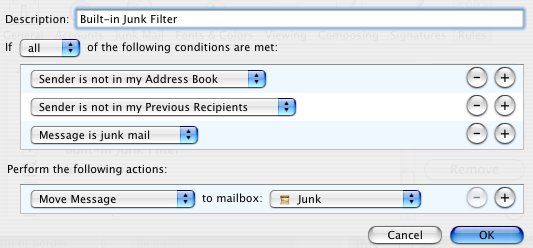
This next rule stops rule processing for all junk mails. All ensuing rules will be for messages the junk mail filter didn't catch, including my inactive rule that calls a separate applescript supplied by JunkMatcher.
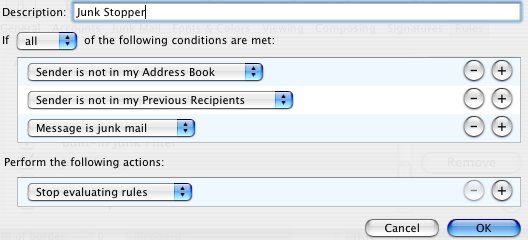
Finally, the very last rule of your ruleset must be to stop processing all rules. This keeps messages from leaking through to Apple's default junk mail filter that we already defined above, which could possibly (I think) redefine emails that you've already tried to organize.
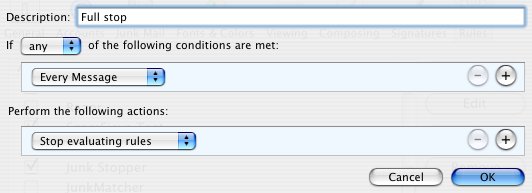
That's it! The end result for me is that my Junk Mail Filter liberally matches lots of spam and some false positives, which go to the Junk Mail folder. Then, Spam Sieve, which I have conservatively configured to leave behind false negatives but NO false positives, keeps most of that Junk Mail from being in the Junk Mail folder, moving it aside to a separate Spam folder (which is what the applescript does if it succesfully tests for spam). So I'm left with a Spam folder with lots of guaranteed spam that I can delete without examining, and a sparse Junk Mail folder that I can review for false positives.
Works great!
If you have read this far, you may enjoy this article on other spam filters that can be used with Apple's Mail.app.
Fidelity Pledge
Fidelity Pledge Press ReleaseThe thinking goes that since infidelity has done more to undermine marriage than homosexuality, politicians that support the gay marriage ban amendment should be willing to disclose whether their conduct matches their rhetoric. So any legislator that is on record of supporting the gay marriage ban is being asked to sign a pledge of fidelity. Right now it's Colorado only; some are calling for it to go national.
There's an effort to make divorce unconstitutional, as well.
February 23, 2004
Museworld Wiki
I'd like to announce my new wiki. A wiki is a collection of web pages that anyone can edit right through their web browser. Yes, that means you. Go over there and try it - all changes are saved, so if you screw something up, I can fix it right back up again.I'll be using it for more static documents that I will want to revise often, and also to invite participation on any collaborative efforts.
I've also started working with a concept I call "social proofs". There's a lack of education out there on civic matters, with many people holding incorrect assumptions on how things work in America. This leads people to hold faulty conclusions. The social proof is a way to present arguments that are well thought-out but concise - if someone disagrees with the conclusion, the can drill down into the argument to research the premises. Finally, if they believe a premise is faulty, they can include their reasoning and declare the proof faulty. Others can then participate in hashing out the premises and modifying the proof.
I've got the beginning of a Proof that seeks to prove that Nader cannot win the presidency. Once I feel that one is sturdy enough, I will be using it to allege that his run is damaging to our democracy. There are plenty of other possibilities for proofs, and anyone can start a new one if they want.
The link to the Proof section is off of the main page of the wiki.
Nader Cedes Democratic Vote
MSNBC - Nader says he's no threat to DemsHere, Nader says he's not really going for the Democratic vote anyway, and that he doubts many Democratic voters will vote for him. This statement will be incorporated into my proof!
I know I'm focusing a lot of attention on this. The truth is it fascinates me because I don't feel entirely resolved about it. I'm being aggressive on my proof because I want to find chinks on how to oppose the system Nader is opposing, but more effectively than Nader is.
Nader Proof
I have been working on my proof that Nader's run is destructive.A subproof is that Nader will not win the Presidency. The proof currently has the following weak points:
- I am attempting to prove that Nader will not take office in 2004 through a system-breaking revolution that installs him in office while ignoring our normal presidential-election process. The occurrence basically requires that such a massive social movement will not take place by November 2004. I'd like to prove that it won't happen.
- I am attempting to allege that Nader will not be able to gain enough support in the House of Representatives to win there should no candidate get a majority of Electoral Votes. I believe that he would get some votes from Representatives whose congressional districts went to Nader, but that it would not be enough for him to win. But I would like more evidence of this to feel sure.
- I am attempting to allege that Nader will not outscore all other candidates in enough states to win the several states outright needed to win the Presidency. I'd need more input from political and polling wonks to make this point more convincingly, though.
So if anyone has comments on how to help buttress the above three points, leave a comment or email me.
I hope to eventually make this proof (and others) available through a wiki.
Dean News
First, Dean comments on Nader.Second, they are trying to find 100 Dean-supporting citizens who will be running for office for the first time in 2004.
I think idly about this sometimes. But for all the information I follow about politics, I know little about what kind of offices one can run for locally, and where would be a good place to start.
Blogging Senate Candidates
Alaskan Democratic Senate Candidate Tony Knowles just posted a guest blog post over at Atrios.Update: Digby expands on Knowles over at the american street. Basically, he defines what it means to be an Alaskan Democrat.
February 22, 2004
Nader Admits More Gore Supporters Voted For Him
Nader for President - www.voteNader.org -
In 2000, exit polling showed that 21% or 25% of my vote would have gone to Bush, 38% or 41% to Gore, and the rest would not have voted.
Fair enough. Nader admitting it is enough for me to declare it undisputed that more Nader voters preferred Gore to Bush than the other way around.
Now we just have to catch Nader admitting that he doesn't think he can win, but that that's not the point. He said that regularly in 2000.
Those two put together would prove that Nader knows he's damaging democracy and doesn't care. In other words, he thinks that increasing the chances of Bush's re-election is a fair price to pay for him marketing his message by running for a presidency he knows he can't win.
That's really want I want to reduce it down to - the argument that sometimes you have to destroy something to eventually heal it. I think that would be an interesting debate to have. I'd sure like to hear Nader's plan to eventually heal the interim damage done to the Supreme Court.
Nader Announces Run
ABCNEWS.com : Ralph Nader Announces Run for PresidencyNader decides to "challenge this two-party duopoly" by taking an action that does nothing to challenge the two-party duopoly. The Electoral College can't exactly change its mind on how it works. Idiot.
February 21, 2004
Pop Vs Soda
This is just delightful. I love it. I have no idea what to say about it other than that.
How Do You Feel About Gay Marriage Today?
Josh Marshall writes about gay marriage, and expands on his points after he gets quite a few responses.I first have to point out one tearjerking email he got from a James in Vallejo, CA:
I just want you to know that my partner and I were married at city hall on Thursday this week. We waiting in line for about 9 hours and were prepared to camp out on the side walk overnight if we had to. In line behind us were two women who had driven 27 hours from El Paso with their son in tow. Just in front of us were two women who had flown in from Virginia and two men who'd flown in from Kansas City. There were also lots of Bay Area couples there. There were couples with babies in strollers and one couple with an aged mother in a wheelchair and hooked up to oxygen.This is not the right time. There is no right time. There is just the right thing to do. This was the right thing to do.
The Republicans and the far right are going to us as scapegoats no matter what we do. We all know that. We have always known that.
Now they know a little more about us.
Here's what struck me today while reading about all this. Josh is writing a different sort of entry here - he's not making an argument or trying to convince anyone of his point of view. Instead, he's sharing his points of view on the matter at a particular time, while knowing that things are shifting enough that his opinions might change very soon. He, like many others, have held on to the protective ambiguity of "civil unions, not marriage", while acknowledging that the demonstrations of real love may be exposing that opinion for the rationalization it is.
I think Josh is courageous in writing this because I think he knows what may be coming. I recently re-read my war position and, while I still believe that what I wrote is insightful and has lots of important points, I'm struck by how much I was laboring to make them. It was an incredible headwind being blown by the Bush administration at that time, and those sorts of headwinds affect all of us. Writing about opposing the Iraq war is a lot easier today, because it's safe.
We're right in the middle of a transformation where it's a little bit easier for Joe Average to see gay marriage as "safe", and for those that feel the headwinds more than others, I think they'll look back at this time later on and be amazed at how much difficulty they had reconciling their opinions. I'm looking forward to Josh revisiting his feelings in a year.
Nader Joins The Argument
The Nation has an open letter to Ralph Nader pleading with him not to run for president.Ralph Nader has written a response.
I like what Ralph writes. He spells out a lot of problems, and a lot of reasons to take action against those problems.
However, nowhere does he show that that action must be Ralph Nader running for president.
Nader is a liberal. I mean, come on. He reads The Nation. Rail all you want at how we are prisoners of a linear metaphor, but he's going to get more support from those who prefer Dem over Bush than those who prefer Bush over Dem.
At the end of the day, he says he's trying to defend liberal interests, but he's doing it by holding them hostage.
"Love animals more, or else the kitten gets it!"
The thing that really bugs me about this is that I'm the type inclined to support Nader. I donated to the Green party in 2000. I like his platform better than I like the Democratic voting record. But I've also put a lot of thought - available in these archives - into what American voting means, where it's messed up, and - most importantly - the best steps to take to improve it. Nader's implication is that the only reason I'm not supporting him is because of fear, or because I'm a sheep, or because I somehow lack the consciousness he has. It's insulting; to me, and to other people whose support he needs.
February 20, 2004
Movable Type Revision History Plugin
I am getting close to completing a plugin for movable type. This allows you to have a full revision history for every weblog entry. I'm also trying to test it, so this weblog entry will serve as something of a testbed for it. The extended entry will have a bunch of gibberish that I'll revise a lot.The quick brown fox jumps over the lazy dog.
And now I have added text up here.
All men something about coming to the aid of one's country. Did Lincoln say that?
There's stuff having to do with html tags that I should probably test as well, well. Yes.
And I wonder what the heck is up with html links?
The blazing glory of pain comes forth at the most inopportune moments,
like when you are trying to make a salad with walnuts and chevre.Rolling your eyes can be hazardous to your health because it can give you
headaches, especially if you roll them too hard.Third eyes aren't always in the middle.
This is a new sentence.
One more to add to the list of comment-spamming, blog-host-faking domains, along with wblogs.com and blogstudio.net: bllogspot.com with a double L, as found in Sam Ruby's comment feed (one of my favorite sources for finding spam domains and blocking them before they find me) with thehomelessguy.bllogspot.com. * One more belonging to the same person, Alexander Morozov, comment-spammer extraordinaire, that is. I was so used to OnlineNIC's whois being down I didn't even think to look.And it appears I have added text down here as well.
I thought I'd try this:
La la la lSee how that works.
Ok, now for lists.
- adding
- adding
- adding
- adding
- addling
- item one
- item two
- iterm three
- item four
- item five
WA Strangeness Continued
I'm getting closer to having a wrap-up of the whole WA caucus matter. In short it looks like there won't be answers to some of the relevant questions. I've been in contact with people from the WA Democratic Party, and they've been somewhat helpful. I hope to have the details up in a couple of days.
February 18, 2004
Kerry The Cliffhanger
I figured out the appeal of the Kerry campaign. He's the "Dunh-dunh-dunh!" candidate!"And so I say to you: We're coming! You're going!"
Dunh dunh dunh!
"I have three words for you: Bring It On!"
Dunh dunh dunh!
"For those that want to make this about national security: I look forward to that debate!"
Dunh dunh dunh!
"If they want to do in this campaign what they did to Dukakis, then everything is on the table. Everything."
Dunh dunh dunh!
It's the chord that doesn't resolve... the crescendo... the cliffhanger... the foreshadowing of something BIG coming... right... after... these... messages!
Here's the thing about cliffhangers.
Part Two usually sucks.
Dean
Dean dropped out today, and also recommitted to continue with the movement he helped start. By doing both, he demonstrated to me again that he is an inherently unselfish man, and has the qualities needed to be a real leader.
February 17, 2004
Dean On Stage
Dean's Wisconsin concession speech didn't have any stunning announcements but there were some interesting touches. He spoke in past tense a few times, for instance, thanking the unions: "They stuck with us through thick and thin."He said the goal of the campaign was to change this country, and said: "guess what, you have succeeded."
He offered general reassurance by saying to think about how far we have come.
He had one that I thought was a nicely genuine touch. He mentioned how many of the people there tonight were young. Paraphrased: "When you're young, you want change to happen fast. The truth is that change is tough, and there's an enormous pressure against change, from Washington, from the Democratic Party..."
He said that they have already written the platform of the Democratic Party for this election. He said that while change had happened, though, it was "a change of convenience, not a change of conviction", and that we needed to keep fighting for that change of conviction. He said that we finally do have a democratic party that found out if you stand up and say what you believe, that voters actually like it.
And then his thematic resting point was "we will not stop." "You have already started to change the party, and we will not stop." He left vague the concept of exactly what wasn't going to stop.
"We are not done yet together." I'm left wondering about the punchline.
WI Projected For Kerry
From the CNN partial returns for Wisconsin...
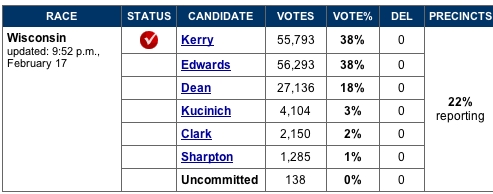
As I said, I think the whole vote-counting thing with projections is weird. See here as Kerry is projected winner even as Edwards currently has more votes.
Update: Obviously, projections is a technical business having to do with statistical sampling and analyzing which sets of returns have already come in and which ones haven't. I just thought it was amusing to see the numbers in that shape.
House Races
Democrats are currently down 228-204 in the House of Representatives. The House, which was initially designed to be the most responsive branch of government to changes in the nation's political tastes, is heavily gerrymandered, and so changes in the balance of power are hard to come by. Well it looks like tonight a Democrat in Kentucky has won a historically Republican district. It's huge news because it's seen as a bellwhether on Bush's political health. One down, many to go.
February 16, 2004
Gay Marriage
I'd really like to see someone with more research abilities than me do a well thought out analysis of the gay marriage debate and how it compares and contrasts with the interracial marriage or "miscegenation" debates of the past. I personally think they are highly comparable, and that the arguments against gay marriage are going to sound just a bigoted a few years from now as the arguments against interracial marriage do now.
February 15, 2004
Electoral College Notes
I've written before that I like the basic intent of the Electoral College and how it tries to represent region as well as population.It's the implementation that I don't like - each state being winner-take-all, with the national winner requiring a majority rather than a plurality. It's what makes third-party presidential runs such a threat to our democracy.
I've thought a better version would be to proportionally award EVs for each state by the percentage support each candidate gets, and allow fractional EVs, and allow a plurality of the total to determine the nominee. It doesn't get rid of the spoiler problem, but it does then mean that we can use preference voting, like Condorcet, to find the winner of each state.
However, I just thought of a problem with that. There is no solid way to determine proportional support for each candidate, that I know of, using preference voting like IRV or Condorcet. You can determine 1st place, 2nd place, etc, but you can't determine what percentage of support each candidate got.
So hrm. I'm stuck again.
Dean Probably Leaving Race
MSNBC - Top aides say Dean may stand downFolks have been buzzing about it for a while, but this is the first I've seen of the Dean campaign itself acknowledging their aims to convert their campaign from a Presidential run to a political movement.
So yeah. Barring a truly bizarre surprise in the debate today or before Tuesday, it basically means Dean is leaving the race.
Mathew Gross's Blog
Mathew Gross is the guy who wrote me personally to ask me if I'd endorse Dean on my weblog, while he was one of the main guys in the Dean campaign. For a while I was flattered and said that I supported Dean "because Dean's the only guy who asked". ;-)Mathew is gone from the campaign now and has started his own new weblog.
Saddam and the U.N.
One thing I'd like to see a bit more often in the news is the statement that it was simply impossible for Hussein to be in compliance with resolution 1441.
February 14, 2004
Sharpton Over Dean
Oof. Sharpton finished ahead of Dean in DC. Here are the results. Kerry wins again.
Dean's Race
I haven't written about Dean in a few days because I've been pretty down in the dumps about it all.If Dean turns it around from this point, it will definitely be a bigger turnaround and transformation than what happened with Kerry's resurgence. It'll be one of the most amazing political stories I can imagine, and I'd be fully behind it. That said, I think that for Dean to win the nomination, it would require something just that amazing.
While a post-mortem isn't exactly appropriate yet since he hasn't dropped out, I do think it's appropriate to think about what has happened that has gotten him to this point, and what was missing to get him further.
I'm referring to some things in past tense not to declare Dean's campaign over, but to emphasize what sort of change is needed to turn things around.
First, the level of Dean's support early on was illusory. I do believe that. The combination of Bush's infuriating behavior and the internet's ability to act as a megaphone for activist behavior served to create a lot of momentum for the activists. It's like that cliche movie scene where you have the complacent enemy standing around bored, and then all of a sudden they hear angry howling, and they see huge menacing shadows on the wall from an advancing enemy... they start to run, and then the enemy turns the corner and there's like three of them. The enemy turns around and mows them down.
Obviously Dean has more than three supporters. But the point is that it's still one person, one vote, and Dean's activist minority didn't have a chance against the complacent majority.
The main problem was with Dean's marketing. They had an awesome marketing strategy to reach the activist grassroots. But it wasn't a dual-purpose strategy; it didn't work very well in reaching the rest. You can almost compare it to Sales - it's like a salesperson resting their reputation on their conversion history rather than their conversion rate. While Dean had done a great job building up early support, he didn't actually have a very good strategy for converting the next very large chunks of voters, who were very different kinds of citizens.
There was of course a ton of things that hurt him that weren't the campaign's fault. Gephardt's murder-suicide act in Iowa (which, I didn't realize, was explicitly admitted by Gephardt's campaign after the fact). The press's freakout in trying to make up for their early lack of Dean examination by running with stories like the Canada talk show and that bizarre time-traveling wife-beating trooper story. The press's coverage of Dean's cheer after the Iowa loss. But in my mind this all served to pile on to a weakness that was already there. I believe that if he had taken steps to shore up that weakness, the other things, while damaging, would not have killed him in the first few states.
The thing is, that weakness is still there. He still hasn't figured out how to turn around the undecided voters. His problem is (and I have to swallow hard to say this), his message still comes across to the layman as basically negative.
In short, he's professing change, but he's focusing on what to change from, not what to change to.
I know this can be argued, but Dean saying that it's a campaign based on hope sounds good, but it's not enough. A Deaniac talking about all the hope they feel is great, but it doesn't seal the deal. The reason is because this kind of hope is amorphous. Most of us Dean followers felt hope about him for our own personal reasons - in my case because I liked how the campaign wasn't top-down, and I judged he'd run the country the same way. But my conclusion there was based off of my own past experience with the Dean campaign, not because of any explicit promise that Dean made about his future administration. The most that I've found he said about that was "I don't see why not," when asked about whether the blog would continue.
Dean is still drawing distinctions against Kerry by pointing out Kerry's bad points rather than explicitly pointing out what he'll do in contrast as President (well, maybe he is, but it's not exactly being aggressively marketed).
So to me, his campaign was missing one basic thing, and I think that if he had offered it, it could have made a huge difference:
Dean needed to market a plan. A comprehensive, thematic system that would allow people to visualize how the country would actually be different under his administration.
I'm really frustrated that he hasn't done this, because it has a history of working. The New Deal. Gingrich's Contract For America. People like it when there's something they can get behind that is more than just the candidate. Dean's always had a credibility problem in that he just seemed too small somehow by himself - the insurgent from Vermont. You combat that by making the campaign be about more than the candidate. He did that, but by clinging to intangible ideals and the momentum of passion. It's ephemeral, it had to dissolve sometime. It might have been different had he marketed a tangible plan for America, where the distinctions from the other candidates would be obvious and he could run on the positivity of the plan.
I hope that after he loses Wisconsin, he goes back to Burlington and comes up with something like this to publish and distribute to everyone in America. It might be the one thing that could give him one last shot.
Cool Maps
Home Page - The National Atlas of the United States of AmericaI found the coolest mapmaking site - tons of free information that you can use to make your own maps online, and tons of gorgeous free preprinted maps that you can download. Probably the coolest find since I found the PDF of the world map of political boundaries (countries) that you can zoom to any level.
February 13, 2004
Recount Solution: Don't Recount!
This article describes Florida's novel solution to the whole ballot recount problem - just don't require recounts anymore.
February 12, 2004
Drudge/Kerry
I've had two people email me already about Drudge. It's always painful to link to that man's site. But this could have a real impact even if it's not true. Evidently there's some big brouhaha over Kerry allegedly having a recent affair with an intern. More interestingly, Clark has predicted (weeks ago) that the Kerry campaign would implode over it, Clinton has supposedly called Edwards asking him to continue the race, and it's the reason why Dean reversed his decision to withdraw after Wisconsin a few days ago. That's all heresy from daily kos .I don't think there's very much active polling going on in Wisconsin, so next Tuesday's election could be very, very interesting.
Update: Al Giordano believes this could have been planted by Kerry. Pandagon believes quite the opposite. Wisconsin's polls are currently awful for Dean.
Bush AWOL Stuff
I have to say that I have a bad feeling about all the Bush AWOL stuff. I think it could blow up in the Democrats faces the same way that a lot of the Lewinsky stuff did to the Republicans.First, I don't really understand what the issue is. Like, why it's actually important other than to make Bush look like an idiot. I mean, that's fun and everything, but what's the substance of it? The only thing I can think of is that if it's finally able to be painted that we've got a wartime coward just in time to contrast it with a Genuine Vietnam War Hero in our alleged nominee John Kerry, it could give him political momentum.
But this stuff about the physical, and arrests? What if it comes out that Bush was gone for a little while because he hit bottom and was addicted to drugs for that period of time? Bush could come on with his whole born-again thing, how he turned around his life, and how he had to keep it secret because of the political hay his enemies would make out of it, and all his supporters would redouble their commitment to him. This could very well end up generating sympathy for him.
Like I said, I don't have a good feeling about this. Stick to 9/11 and Iraq and jobs and the deficit and... good god, it's not as if we're lacking for relevant material.
Trippi's Blog
Change for America: Digital DemocracyJoe Trippi has a blog now, and here he personally addresses the whole brouhaha about his paycheck.
February 11, 2004
Palindrome Poem
I finally found that awesome poem I read a long time ago and have mentioned to my friends. It's a Palindrome Poem, called "Doppelganger", written by James A. Lindon. You can start either with the first line and read forward, or the last line and read in reverse, and it's the same poem... but that structure has a cool dramatic effect, too.Doppelganger
Entering the lonely house with my wife
I saw him for the first time
Peering furtively from behind a bush --
Blackness that moved,
A shape amid the shadows,
A momentary glimpse of gleaming eyes
Revealed in the ragged moon.
A closer look (he seemed to turn) might have
Put him to flight forever --
I dared not
(For reasons that I failed to understand),
Though I knew I should act at once.
I puzzled over it, hiding alone,
Watching the woman as she neared the gate.
He came, and I saw him crouching
Night after night.
Night after night
He came, and I saw him crouching,
Watching the woman as she neared the gate.
I puzzled over it, hiding alone --
Though I knew I should act at once,
For reasons that I failed to understand
I dared not
Put him to flight forever.
A closer look (he seemed to turn) might have
Revealed in the ragged moon.
A momentary glimpse of gleaming eyes
A shape amid the shadows,
Blackness that moved.
Peering furtively from behind a bush,
I saw him for the first time,
Entering the lonely house with my wife.
February 10, 2004
Clark Dropping Out
ABCNEWS.com : AP: Clark Drops Out of Presidential RaceCould be good for Dean, could be good for Edwards. Unless he endorses Kerry.
Dean's WA Delegates
King County Caucus ResultsFor those of you who remember an email floating around about a WA voter who witnessed three of Dean's delegates get inaccurately recorded for other candidates, the county where this happened is putting online spreadsheets that show all of the delegate totals for each precinct in that county. Right now only the 36th District is up, but the others should be coming soon. They are doing a recount of some of these districts. What this means is that for King County anyway, voters can look up the recorded vote for their precinct and verify if the total is the same as what they remember. If it isn't, they can write a letter to the state chair to ask for a data recheck.
Kucinich Making A Run?
Big, Left, Outside: Noon Exit Poll Numbers: TN and VAAl Giordano, who foretold Kerry's rise when everyone wrote him off and has a fair amount of insider experience, shares a "mischevious thought" about how Kucinich could actually emerge as the lone anti-Kerry and what affect it could have on the race.
Trippi's Supposed Conflict Of Interest
The CJR Campaign Desk has an article wondering aloud why more wasn't made out of Trippi earning a commission on the Dean ads bought from his advertising firm.I think it's probably because it would be pretty ridiculous to make the case that Trippi's chief goal in the campaign was to make money off of advertising. Like all the traveling, cracked ribs, strategizing, and cheerleading was just him going through the motions to land his ad buys. Right.
Trippi Notes Flaws Of Transparency
Joe Trippi spoke at a conference this weekend and noted the flaws of having a transparent political campaign. Some of the heavy-duty bloggers will probably be covering this talk in much more detail in coming days.
February 09, 2004
Calling the WA Democratic Party
I have another status report over at dailykos regarding my efforts to talk to people in WA about all the numbers. See my previous entry to know what I'm talking about.
February 07, 2004
Precinct Reporting Is Weird
Here were the precinct results in WA with 16 precincts reporting:
John Kerry Dem 593 35.0% 0 Howard Dean Dem 486 28.7% 0 Dennis Kucinich Dem 432 25.5% 0 Wesley Clark Dem 66 3.9% 0 John Edwards Dem 58 3.4% 0
(update: This probably was supposed to be 16% precincts reporting.)
And here they were with 140 precincts reporting:
John Kerry Dem 1321 49.3% 0 Dennis Kucinich Dem 499 18.6% 0 Howard Dean Dem 487 18.2% 0 Wesley Clark Dem 151 5.6% 0 John Edwards Dem 138 5.2% 0
(update: I corrected a typo in the above table. Plus, 140 precincts has to be wrong, because there are an average of four delegates per precinct in WA. This had to have been a typo on the AP's part. It's more like 1300-1350 precincts.)
That strikes me as odd. What's with Kerry practically sweeping 124 4% of the precincts, except for Kucinich having significant support and Dean coming in last with only one additional delegate?
Here's a history of the WA precinct reporting.
Update: I also wrote about this over at daily kos where it is starting to raise some concern. I'm relieved because I thought it would just look like I was trying to make an issue out of nothing. I just want to nail down the loose ends. Others are sharing stories about how when a precinct came up with votes, the computer operator input a different number of votes. Please read on or participate if you have ideas for next steps, if any.
Update: There is a follow-up post at dailykos detailing one voter's experience of witnessing delegates being unfairly taken away from Howard Dean.
Update: There is another another follow-up over at dailykos that shows status from the above WA voter in trying to verify precinct data.
Update: Make sure to read my main weblog to see more status reports.
Read on for more details...
This is the screenshot of when 140 ~20% of the precincts were reporting. Dean gains one delegate out of 124 4% of the precincts, while Kucinich gains 67.
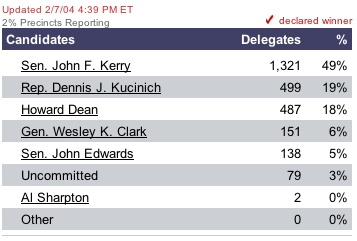
Then for a short while, CNN had the following numbers up - with 21% (around 1376) precincts reporting. Kerry's numbers are slightly less, and Kucinich's are signifcantly less, enough for there to appear to be a much bigger lead for Kerry. The Kucinich situation is strange because he had a strong total for a more than one phase of reporting, and here his numbers go down significantly. If this was a simple error, what was it? These numbers, used by CNN and Fox, were not AP numbers, and Fox was overheard saying they got their numbers from the Democratic National Headquarters.
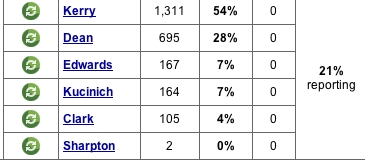
Almost simultaneously, the AP updated their numbers with 1397 precincts reporting. Notice that here, Kucinich's numbers are still high, and Kerry is below 45%. This set of numbers stayed up on the AP wires for several minutes.

The previous CNN batch of numbers was only up for a couple of minutes, before they were replaced by this next set of numbers. Notice that these numbers still have little relation to the AP numbers, and Kucinich's numbers are still low. This set of numbers with Kerry at 50% is the one that was reported in all the articles and repeated ad infinitum by Fox News. Note that they say 32% precincts are reporting.
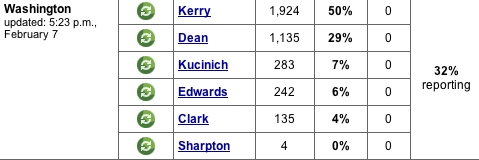
Here is where it gets stranger - soon at 2:31 PST, the AP released new numbers, with 2248 precincts reporting, later revised to be 2125 precincts reporting. This has more precincts reporting than the above CNN/Fox numbers, but Kerry has less delegates, and his delegates are more in line with all the other AP numbers. Also note that Kucinich is still up in the 500 range - also consistent with the AP numbers, but in conflict with Fox and CNN.
This makes me curious about what the heck was up with that set of numbers that Fox/CNN was reporting, of Kerry at 50% with 1924 delegates - which was the set of numbers reflected in the wire articles. They don't even appear to be based in reality, even when these were the numbers reported all over the news.
The revision from 2248 precincts reporting to 2125 precincts reporting:
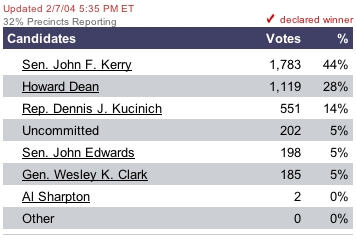
At 2:49, CNN finally revised their numbers. The Kerry@50% numbers were at 32% reporting, while these are at 34% reporting. Note that Kerry's numbers are revised downward, significantly. Why were Kerry's numbers inflated for the set of numbers that all the news articles talked about?

Note that as of 2:54, Fox was still referring to the other set of 34%-reporting numbers that had Kerry at 50%.
Soon, at 2:58, CNN updated their numbers again. While everyone else's numbers grow significantly, Kucinich's numbers are again revised downward, which again, is weird.
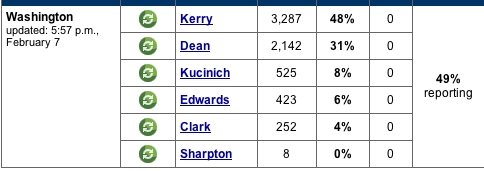
Things start progressing more regularly from this point. At 3:22, 55% (3588) are reporting.
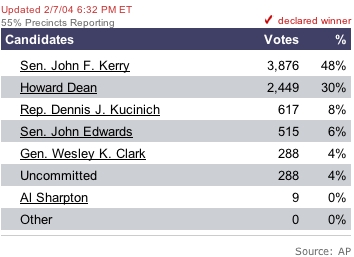
CNN, WaPo, and AP project Kerry at 3:43.
At 4:20, all three sources release numbers from 71% precincts (4624) reporting:
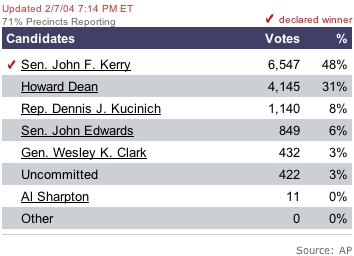
Additionally, the AP has a first draft of delegates apportioned - this is not the complete slate of delegates, but perhaps only from certain congressional districts:

From this point on, they grew basically proportionally until the latest results, 97% reporting:

So here are my questions. For someone like me who doesn't work in the Secretary Of State's office, I would expect that once a number is received from the precinct, it is vetted before it is released to the AP. And when 500 precincts are reported, I'd expect that all candidates' delegates should grow or at the very worst, remain the same, when 1000 precincts are reported. Instead, we're seeing a lot of examples of delegates going down. So most of my questions concern where the errors are happening. Do we know that certain precincts vastly misreported their delegate count? Who is it that has the power to revise the numbers? How could Kucinich's numbers have sunk by over three hundred delegates when each precinct didn't have more than twenty or thirty delegates to award? Could that many precincts have been wrong all at the same time?
But my bigger question is, where's the opportunity for monkey business? How do we know there isn't any cheating going on here? I'm a programmer that has to deal with security issues on a daily basis, and I know that security isn't just about monitoring the entry and exit points - you have to be vigilant at every step along the way. When a precinct captain calls in their numbers, how do we know that the other end is recording those numbers? When the precinct captain goes home, they can't trace it back in reverse. Where's the list that shows exactly how many delegates each precinct got, and how that adds up to the total, so every precinct captain can then refer to the same document and verify that that was their total? I heard that in other states, this information is not published because the parties want to keep that demographic information private from other political parties. If that is so, it is definitely opportunity for fraud through obfuscation.
I am not alleging fraud, or even opportunity for fraud, because I honestly don't know enough about how it works to point out the opportunity. But it did strike me as weird that there was so much downward revision of delegate numbers after they had already been reported.
Update:
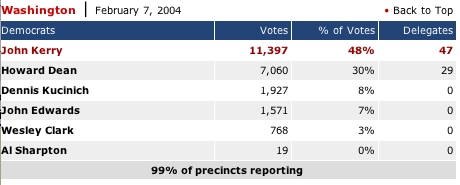
This is with 99% precincts reporting. Note that there are still over 4,000 delegates left to be awarded out of 27,000. There are 55 precincts left to report. Remember that there is an average of four delegates per precinct. What is it that is up with the remaining precincts? What are the chances that only 55 remaining precincts - with 4,000 delegates between them - would mirror the percentage split of candidates that has already been reported?
February 06, 2004
"The Fix Is In"
Josh at Talking Points Memo puts his finger on why the Iraq commission is useless.
Roy Neel Is Human
Blog for America:"Last Tuesday night I let myself get a little down." - Roy Neel, Dean campaign manager.
Man... that's more like it. That seals the deal for me, I think that the move from Trippi to Neel was a good one. Acknowledging doubts and rebounding to hope is a lot more genuine than denial-filled cheerleading. This guy's got credibility.
John McCain's Objectivity
MSNBC - Intelligence panel includes McCain:"The president of the United States, I believe, would not manipulate any kind of information for political gain or otherwise." - John McCain
Well, isn't that the whole point of the damn commission? Why even show up?
MA and Gay Marriage
Here's two quotes on the MA gay marriage decision.Dean: "Today's decision by the Massachusetts Supreme Judicial Court represents a different approach to the same goal. One way or another, states should afford same-sex couples equal treatment under law..."
Kerry: "I oppose gay marriage and disagree with the Massachusetts court's decision."
The thing is, what Kerry said is going to be widely accepted as a bigoted statement fifteen or twenty years down the road, and everyone knows it, even the Republicans. This debate is going to parallel the debate on miscegenation.
Kerry reacts to what he thinks the national mood is, and forgets about the option of trying to actually lead. I do not believe Kerry is a leader, and I fear that the population is going to realize this about him too late to make a change in nominee.
WA Radio Ads
Home Page TruthandHope.OrgThis is more like it. A couple of Deaniacs in WA soliciting donations from people who have already maxed out their donations for Dean, to air some home-produced radio ads - which are quite good - on the radio station in Washington State. They only need a couple thousand dollars and have already managed to buy a ton of ad time.
Remind Us
Kai Curry has a great flash presentation of audio snippets of our leaders giving justification for the Iraq war. It's a great presentation of it all, at least up until it starts doing that thing with the American flag, which is way too heavy-handed.
February 05, 2004
Kerry's Appeal
I think I finally figured out why Kerry has the appeal he does.For months, we've had polls where an "Unnamed Democrat" beat Bush in 2004, even though Bush beat all of the named candidates head to head.
Kerry's the only one that was smart enough to realize that and co-opt the "Unnamed Democrat"'s campaign. He's making himself as bland as possible. Kerry symbolizes nothing except for "Not Bush", and that's why people are voting for him. Bush has bullied everyone for three years into a state of learned helplessness, and they're stumbling through with barely enough wits about them to blindly reach for the most obvious Not Bush candidate out there.
All the rest of the candidates make these voters think. They don't want that. They just want a generic, obvious, Not Bush guy so they can get on with it already.
February 04, 2004
Prancing Horse
MSNBC - Cubans sailing vintage car caught off FloridaWe played a card game where guys ask girls "guy questions" and vice versa. We asked a friend "What car has a prancing horse as its icon?" She answered "Buick?"
Well, a Buick isn't really a Ferrari, but, as the article shows, you can evidently do some things with it that you wouldn't with a Ferrari...
From Dean To Everyone Else
Many-to-Many: Exiting DeanspaceFor those wondering why Dean lost so many supporters so quickly in the first few states, Clay Shirkey has a very well-argued essay about why that might be - his argument is that the vast number of supporters might never have been there in the first place.
The Horse Race
Here's how the actual delegate race looks as of now.
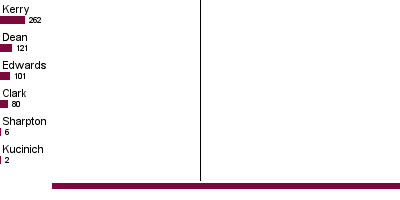
This is a quick program I wrote where I can store the current delegate total for each candidate in a database, and automatically generate the image based on election results.
The black line is where a candidate needs to get in order to be the nominee.
Long way to go, huh?
(And not bad, if I do say so myself, having written it in 40 minutes.)
Update: Well, it appears that CNN has one that is just a teensy bit prettier.
Bad Night For Voting
So, I'm officially depressed about politics for the night.For one thing, Measure 30 failed. Convincingly. Hugely. 60-40. That's just awful.
I have to start challenging myself to consider if there's a whole layer of Oregon politics that I don't know about, like maybe there really is just a whole lot of unnecessary spending going on that I don't know about, and all this talk about it hurting the kids and the poor and the elderly and the ill are fear tactics. I don't know. I've never exactly seen any evidence of that, though. So it's just so much easier to think there are a lot of Gollum-looking desperate money-grubbers that don't believe in a public good, like Kevin Mannix.
And the other one is that I did witness tonight how this damn "Iowa Bump" had such a huge difference for Kerry in all these states. I mean, that bump is huge. Depressingly huge. I didn't realize that such a large percentage of the primary-voting population were sheep. And that's really it, sheep. Where did all these Kerry supporters come from overnight? He was in the toilet four weeks ago. Dean's policies didn't change. Kerry's policies didn't change. Sure, some of Kerry's supporters were from "undecided" folks, but only a portion of them. The others were switchers. Dean didn't become a worse candidate all of a sudden or anything. The only thing they are responding to is the media. They read that Kerry won somewhere, so they switch their vote. As if they get a prize for picking the winner. It's treating a vote as a lottery. You don't get a prize for picking the winner. Your responsibility is to vote your damn preference. I don't get it.
Like I said, it's enough to depress me on a pretty central level. If this feeling continues I will actually come away feeling more and permanently cynical about society than I did before this election. And that's a loss. Damn it.
February 03, 2004
More Diebold Strangeness
explodedview: Kerry Beat Dean in New Hampshire by Only 1.5% When Computers Weren’t Doing the Counting:There very well could be (and probably are) normal explanations for this, but this is the problem with Diebold, is that you don't know for sure, and there isn't reason to trust them.
Live Coverage
Most recent news on top. refresh to see newer information.In review: Kerry wins five states, Edwards wins one, Clark wins one. I'm frustrated that Dean missed getting delegates in North Dakota and Delaware. He might even miss getting delegates in Arizona. (And update: he's sinking fast enough in NM that he may even miss delegates there.) Edwards got many more delegates than Clark today. Dean still leads Edwards for second in the delegate count, but many will scoff at that number and I don't know how likely it is that Dean will lose any of his pledged superdelegates.
Read on for my live-blogging notes of the results tonight.
I may have spoken too soon about NM. Dean's at 20% right now, with 43% reporting. He's sinking fast. I think that if he gets below 15% in NM, then it's basically over for him - WA would be his last stand.
NM has been called for Kerry. I think Dean did not beat expectations for 2/3. He might have met them. But if he only lands delegates in one state, that could hurt.
Clark is pulling away from Edwards a bit in OK with 97% reporting - up by almost 2,000 votes.
Dean is dipping below the viability point in AZ with 66% reporting...
It appears the 95% reporting figure at the NM Caucus site is wrong. We're still only at 22% reporting, but it appears Kerry might be pulling a way a bit more - up by six right now. :-(
Daily Kos user bball has some allegations about more dirty tricks Kerry is pulling, about NM not awarding absentee ballots to Dean requesters. I saw a more detailed description somewhere else but can't find it right now.
The NM Caucus site has results, with around 95% reporting. Looks like it is Kerry winning by four, with Dean and Clark about tied for second.
Looks like provisional ballots and absentee ballots are not the same thing.
The word is that the initial results showing a strong Dean in NM were the absentee ballot count.
The provisional ballots, which are sealed, are for when people show up at the caucuses but don't have the right registration information. They fill out a provisional ballot and leave. They are then sealed to be counted later.
Arizona is called for Kerry, but Dean is above the viability line at 18%, in third place, with 52% reporting.
Kerry pulls ahead of Dean a bit in NM, 29-25, 15% reporting.
Those are the only two states where it looks like Dean can get delegates tonight.
A frustrated Dean volunteer in Seattle vents about Kerry "cheating" by using robocalling and push-polling - by going through Dean's list of voters and calling the phone numbers.
CNN has Sharpton receiving a delegate in DE somehow, not sure if that is a typo.
Dean has fallen from 14% to 12% in ND, 96% of precincts reporting. So less chance of viability there.
Clark is now ahead of Edwards in OK, but only by 800 votes, 88% reporting. What's funny is that ultimately doesn't matter because they will both get an equal number of delegates out of it. But "who wins" makes a huge difference to the press, even though it shouldn't. Stupid press.
Someone just mentioned that the three-way-tie in NM is from counting only the mail-in ballots. If that's true, that's probably bad news for Dean's chances. I'm still trying to figure that out. A bunch of stuff about mail-in, absentee, provisional, and sealed ballots, and I don't know if all four are the same thing or not.
Also, Trippi said that the NM results would give WA voters a good indication of if he could win in WA, which I took as a code for WA voters to be reassured by NM's finish that it was ok to vote for Dean. If he was reacting to the NM vote totals when the totals were actually in an inaccurate proportion, it might have been stupid for him to say that.
Evidently Clark is ahead of Edwards by twelve votes at this moment in OK. They've swapped leads three times in the last fifteen minutes.
Dean is at 14% in ND (50% reporting). Close to viability.
Evidently NM is close, and that's without the absentee ballots, which evidently will take a couple of days to count since they are still being shipped around (which seems weirdly disorganized to me). But if Dean or Clark have an absentee advantage, then it could make a difference in a close race.
Kerry and Dean tied at 27% in NM, with Clark at 25%, with 0% precincts reporting. ;-)
It looks like OK is going to be between Edwards and Clark, with Kerry definitely third. That makes the race tighter.
Rumors are that while Kerry appears to be winning ND, Dean might be reaching delegate viability there, which is a surprise.
Lieberman is making his withdrawal speech.
Sharpton didn't reach the viability point in South Carolina, it appears. Hopefully he will leave soon.
Big news: evidently exit polling shows that NM is a three-way tie between Kerry, Clark, and Dean. Even a strong showing by Dean in NM would be beating expectations.
Kerry is projected to win Arizona.
To review, Edwards won S.C., and OK is a close three-way tie between Edwards, Clark, and Kerry. Kerry won MO and DE.
I just heard a random Kerry supporter say they supported Dean for a long time but eventually went to Kerry because of electability... but still liked Dean... and was torn. Frustrating! There's like 30% of active voters out there for which "electability" is a NEW CONCEPT, new enough to make them switch their vote on a dime. They don't stop to think that maybe it's wrong.
"Sources" just announced Lieberman will withdraw from the race tonight.
Wes Clark Jr.
Calpundit: Halftime ScoreThere's an article here written about Wes Clark's son and things he says about the race that I find refreshing. He's frustrated about the dirty campaign tricks, and I think there's too little attention being paid to these things. Wes Jr. has participated on some of the same sites that I have and you come across his comments now and again. It's one of the things that helps humanize Clark to me, which I think (no thanks to the media treatment) he needs.
2/3 Exit Polls
I don't have the numbers (because they're not relevant that specific anyway), but exit polls show that Clark may not place first in any of the states, while Edwards might in OK as well as SC. If that's true, it's possible that Clark may drop out as well, unless he also follows Dean's lead that only 10% of the delegates have been awarded so far.2/3 Predictions
Well, tomorrow's going to be another day of Dean not winning, so I'm not really looking forward to it. The campaign has been quite vocal about how they aren't looking to win tomorrow, although I can't help but wonder if they are disappointed at how the numbers are looking tomorrow.Given how the numbers look, what would be beating expectations is if Dean got anywhere near close to 1st in New Mexico, and above the viability line in Missouri, Arizona, and Delaware. So maybe the goal is to get delegates in more than half the states.
There's been buzzing that due to absentee ballots, Dean may have gotten a boost in the southwestern states, but there's also been buzzing that the absentee ballot situations have been an enormous screw-up in those states also - people not receiving their ballots, people having enormous trouble changing party registration, etc.
The only other hope is for Kerry to come out of tomorrow looking weakened. He's behind in Oklahoma (to Clark and Edwards) and South Carolina (to Edwards), and Clark is close to him in both Arizona and North Dakota.
Lieberman should be dropping out tomorrow. Who knows when Sharpton and Kucinich will.
I'm predicting that both Clark and Edwards will come out of it seeming kinda strong, but neither weak enough to consider dropping out, which would mean that neither of them would be able to consolidate into a true anti-Kerry.
There's a bizarre press meme lately where the press is reporting on how the press isn't being very hard on Kerry. It's like they feel so bad about pounding on Dean that they are going easy on Kerry to make up for it.
Kerry should get delegates in all seven states. Dean could get delegates in four states. Edwards should get delegates in four states. Clark should get delegates in five states. It's possible that after tomorrow, Dean could still be in second place with delegates.
February 02, 2004
Wiki Blog
Notes on how I could make my weblog system more like a good thought management system:Right now this is great for reverse chronological thoughts, but that is not the only way I think. ;-)
Some documents/entries I would want to label, revise, and refer to easily.
I believe this could be accomplished by just a few simple additions.
- Add revision control to certain (or all) weblog entries, so people could click to see previous revisions.
- Mark certain entries as being articles instead of weblog entries, and track these articles separately
- Make it easier to refer to these articles using keywords and labels
As for the second, I could easily accomplish this on my weblog by doing something webloggy like only using the continuation field for those weblog entries, or summaries, or certain keywords. Movable type could then be set to put them in a different category or use a different entry template for these entries. (Or they could simply use a different category.)
The first one is the hardest. I honestly don't really have much use for a wiki at this time other than wanting the revision control.
And... it looks like there isn't a revision control plugin for movable type. I'm not aware of there being one for weblogs at all, other than the one that Mark Pilgrim uses, which I don't think he's made available to the public.
So the remaining option is to install a wiki (one with a revision history feature) with some modifications. The modifications would be:
- Be able to refer to wiki nodes that would render themselves as small html chunks rather than full pages, so they could be encapsulated within a weblog entry
- Be able to set preferences on each node so that some could be editable by all, while others could only be editable by certain people like the author
- Be able to write a weblog entry with a one-line php command or something that would then load and display the wiki node for display on the weblog
- Install a movable type wiki plugin so that you could just type in a keyword/wiki-label that would then automatically link to the wiki node in question. Blosxom has something like this, not sure if movable type does. This would also be optional.
Two Quotes
"If you think that if I were President, we'd be in Iraq right now, you shouldn't vote for me." - John Kerry, to journalist Eric Alterman."If Howard Dean were President, Saddam Hussein would still be in power." - John Kerry, only days later.
More Diebold Weirdness
Eschaton has a post about the latest example of Diebold voting machine weirdness. And they call us conspiracy theorists! God, I hate how this sort of thing is so hard to bring awareness too. You just want to shake the country by the shoulders and scream, "What are you thinking?!" Idiots. Idiots.February 01, 2004
Things To Do For Dean
I'm feeling edgy or itchy or something... like there's a whole lot of space open up right now, more opportunity to fill it and turn things around for Dean.There are so many people and so little time, so many possible things to do.
This week in Oregon there are things we can do to help out for the caucuses in Washington State. People can also canvas in Vancouver. I'm considering doing something but I'm also nervous.
The big challenge for Dean supporters is to figure out how to keep oneself close to the surface - so many people deciding the vote are forming their points of view almost arbitrarily. "Well, I really want to beat Bush, so I guess I'll vote for the guy with the best shot of doing that. Who would that be?" And then they just sorta pick one.
I personally think that the lesson to pound home over and over again is the 2002 mid-terms. In 2002, hopes were high that the Democrats would gain on the Republicans. So since everything was about foreign policy then, even though many of the Democrats had reservations about the Iraq war, they went along with the Republicans, thinking that would make them more electable. And it turned out they got absolutely stomped.
This included Kerry and Edwards. They focus on electability instead of convictions, and when you do that, it turns out you're not as electable. Dean's the guy who stood up for what was right when it wasn't popular, and that's what led him to gaining all the support later on, after everyone realized the so-called "electability" strategy was a bust.
What's happened recently is that people's memories are short. They're scared again, and they're focusing on diagnostic electability, rather than integrity, guts, and passion. They need to be reminded of 2002 and what happens when people focus too much on electability. They'll learn the lesson again eventually - all you have to do is keep a close eye on Kerry and watch how he folds when he's given a tough choice - but we need to help them learn it before it's too late.
